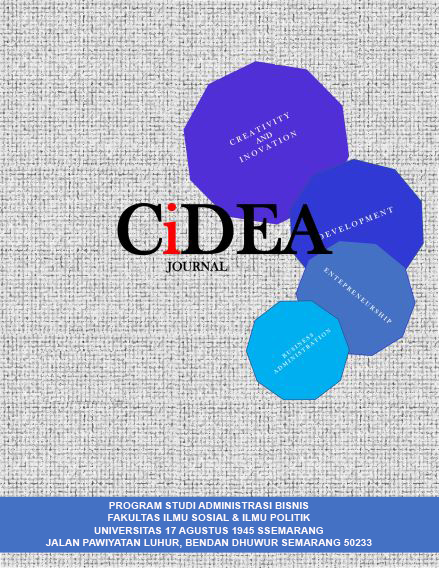Pengaruh E-Trust dan E-Service Quality Terhadap E-Satisfaction Pengguna Situs E-Commerce Tik Tok Shop Dikalangan Mahasiswa
DOI:
https://doi.org/10.56444/cideajournal.v3i1.1961Keywords:
E-Trust, E-Service Quality, E-SatisfactionAbstract
Effective leadership and employee discipline are essential to maintaining a productive and professional workplace environment. Leaders are expected to open up two-way communication so that employees can fully understand the Company's goals in achieving performance. Companies need to have a clear and consistent approach to employee discipline to ensure that employees understand company policies and comply with performance expectations. In addition, employee discipline helps identify and correct behavior or actions that are detrimental to the organization
References
Ainur, R. (2007). Pengaruh dimensi kepercayaan (trust) terhadap partisipasi pelanggan e-commerce (studi pada pelanggan e-commerce di Indonesia). Universitas Brawijaya.
Armstrong, P. T. K., & G. (2018). Principles of marketing (17th ed.). Pearson Global Edition.
Ashghar, S. A., & Nurlatifah, H. (2020). Analisis pengaruh perceived ease of use, perceived usefulness, dan perceived risk terhadap keinginan membeli kembali melalui e-trust dan e-satisfaction (studi kasus pengguna Gopay pada transaksi UMKM). Jurnal Al Azhar Indonesia: Seri Ilmu Sosial, 1(1), 40–51.
Baskaran, M., & S. K. (2018). Recent trends in e-commerce. 6(1), 40–44.
Dani Octa Melani, & Rahmiati. (2021). The influence of e-service quality, e-trust, and e-satisfaction toward e-loyalty on Shopee online shopping application users. MMS Marketing Management Studies, 1(3), 253–266.
Demir, A., Maroof, L., Sabbah Khan, N. U., & Ali, B. J. (2020). The role of e-service quality in shaping online meeting platforms: A case study from higher education sector. Journal of Applied Research in Higher Education, 13(5), 1436–1463.
Hanifati, U. M., & Samiono, B. E. (2018). Analisis pengaruh website quality dan eWOM terhadap purchase decision melalui online trust pada situs tiket travel dan reservasi hotel online di Indonesia (studi kasus pada Traveloka.com, Tiket.com dan Pegipegi.com). Jurnal Transformasi, 2(1), 37–50.
Hasan, A. J. Y. M. P. (2009). Marketing edisi baru.
Ivastya, R., & Fanani, Z. (2020). The impact of e-service quality on e-satisfaction and implications on B2C Shopee.com online repurchase: A case study of Indonesia. International Journal of Advances in Scientific Research and Engineering, 06(07), 01–09.
Kotler, P. T., & Keller, K. L. (2016). Marketing management (Global Edition) (15th ed.). Pearson Global Edition.
Laudon, K. C., & Traver, C. G. (2021). E-commerce 2020-2021: Business, technology, society.
Liani, A. M., & Yusuf, A. (2021). Pengaruh e-trust terhadap e-loyalty dimediasi oleh e-satisfaction pada pengguna dompet digital Gopay. YUME: Journal of Management, 4(1), 138–149.
Malau, H. (2018). Manajemen pemasaran: Teori dan aplikasi pemasaran era tradisional sampai era modernisasi global. CV Alfabeta.
Parasuraman, A., Zeithaml, V. A., & Malhotra, A. (2005). E-S-QUAL: A multiple-item scale for assessing electronic service quality. Journal of Service Research, 7(3), 213–233.
Raza, S. A., Umer, A., Qureshi, M. A., & Dahri, A. S. (2020). Internet banking service quality, e-customer satisfaction and loyalty: The modified E-SERVQUAL model. TQM Journal, 32(6), 1443–1466.
Romindo, M., Muttaqin, S., Saputra, D. H., Purba, D. W., M. Iswahyudi, Banjarnahor, A., & Simarmata, J. (2019). E-commerce: Implementasi, strategi dan inovasinya. Yayasan Kita Menulis.
Sativa, A., & SRI, R. T. A. (2016). Analisis pengaruh e-trust dan e-service quality terhadap e-loyalty dengan e-satisfaction sebagai variabel intervening.
Sutrisno Hadi. (1986). Metodologi penelitian research. UGM Press.
Tjiptono, F. (2019). Pemasaran jasa: Prinsip, penerapan, dan penelitian (1st ed.). Andi.










